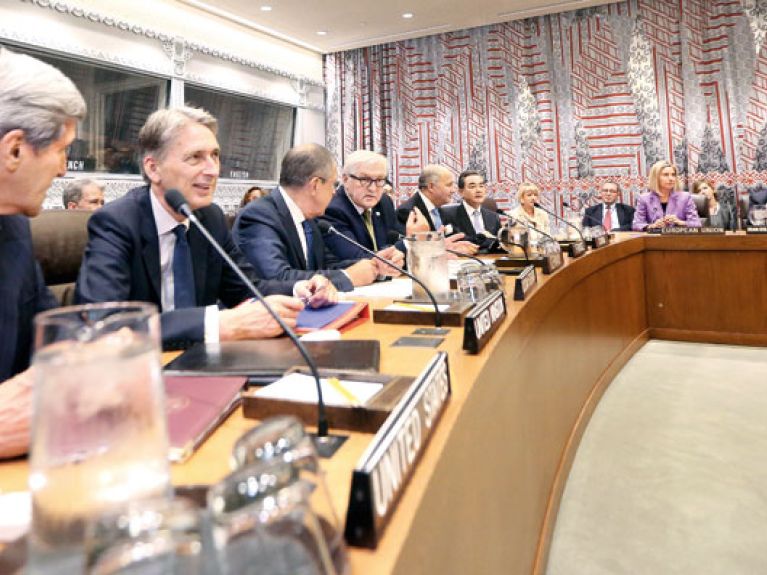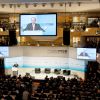Commitment for peace
Taking responsibility within the United Nations is a fixed element of German foreign policy.

In 2015, the United Nations (UN) celebrated the 70th anniversary of its foundation. In the Preamble of the 1945 UN Charter member states declared their determination not only to maintain international peace and security, but also to promote the economic and social advancement of all peoples. Accordingly, the core tasks of the UN also include securing sustainable development, protecting human rights, upholding international law and delivering humanitarian aid. In the light of the growing challenges, the UN is being subjected to increasing pressure and criticism. One common reproach is that the organisation is too unwieldy and weak when it comes to implementing decisions. However, no other international institution has comparable global reach, thematic breadth and legitimacy. The universal values and principles of the international community are anchored in the UN Charter; and 193 states have already made a commitment to these values and principles under international law through their UN-membership.
The Federal Republic of Germany and the GDR were accepted into full membership of the UN in 1973. For many years the Federal Republic did not play any great political role in the world organisation. Following reunification in 1990, however, Germany explicitly declared its intention to assume greater international responsibility. A little later, the desire for a permanent seat in the UN Security Council was formulated for the first time. Since then its commitment to the United Nations has been one of the core elements of German foreign policy.
Today, Germany is the third largest contributor to the regular UN budget – after the USA and Japan – making an annual contribution of approximately 190 million US dollars. In addition to this, it remits payments for peacekeeping missions as well as assessed and voluntary contributions that benefit other institutions within the UN system. In keeping with German UN policy’s understanding of its own role, Germany should not only attempt to cover all areas of UN activity, but also attach importance to continuously developing the institutional structures of the organisation.
Germany also makes an important contribution to peacekeeping through its human resources and logistical support of individual missions. At the beginning of 2015, roughly 5,000 members of the Bundeswehr and over 300 police officers were serving in international operations. The main emphasis here is on UN-mandated NATO and European Union missions in Afghanistan, the Balkans and the Horn of Africa. These will now be joined by the deployment in Syria, which can only be indirectly based on UN resolutions. Far less personnel is seconded on so-called Blue Helmet missions, which operate under UN control, for example in Lebanon and Sudan. Nevertheless, the Federal Government has committed itself to improving the training of personnel for such peacekeeping missions.
The primary responsibility for the maintenance of international peace and security rests with the Security Council. In 2011 and 2012, Germany was represented on this body for the fifth time as a non-permanent member. Many of the challenges that appear on the agenda of the Security Council continuously concern the Federal Foreign Office in its daily work. For example, Germany is one of the negotiating parties in the nuclear dispute with Iran. One long-term project of German UN policy is to reform the Security Council and possibly even enter the body as a permanent member. The Federal Government is pursuing this goal in close coordination with Brazil, India and Japan. In general, the aim here is to make the Security Council more representative by broadening its membership.
In the field of sustainable development, Germany’s attention is focused primarily on the 2030 Agenda that was agreed in September 2015 and consists of 17 Sustainable Development Goals. Germany was already deeply involved in the preparations. Another subject that traditionally defines German UN policy is the protection of human rights. Accordingly, Germany was again represented from 2013 to 2015 as a member of the UN Human Rights Council. Together with Spain, Germany is actively supporting the human right to clean drinking water and sanitation. Other areas of activity include the protection of children in armed conflicts, the abolition of the death penalty, combating torture as well as the promotion of rights of persons with disabilities. A current project that Germany is pursuing with Brazil is the protection of the right to privacy in the digital age. On the initiative of the two states, since 2013 the UN has been increasingly focusing on the problem of the massive surveillance of private data.
It is frequently overlooked that Germany is also a host of the UN system. The focal point of this engagement is the UN Campus in Bonn, which opened in 2006 and has primarily established itself as a centre for activities in the field of sustainable development (see page 81). Currently, 19 of the 28 UN offices in Germany are based there. Other offices are located in Berlin, Dresden, Frankfurt am Main, Hamburg and Nuremberg. It is the declared goal of the Federal Government to make Germany even more attractive as a location for international bodies and nongovernmental organisations.
UN institutions perform valuable work every day. It is evident, however, that when it comes to dealing with overarching political questions, states are increasingly choosing alternative cooperation fora – for example, informal groups like the G8 or G20. Problems that apparently cannot be solved under the UN umbrella are addressed within these forums. This may sometimes be a more effective way of facilitating global government. However, when it comes to legitimising the international use of force, there continues to be no alternative to the United Nations and in particular to the UN Security Council. It is therefore all the more important for Germany to invest in the further development of these structures. ▪
Dr Christian Schaller is Deputy Head of the Global Issues Research Division at the German Institute for International and Security Affairs (SWP).

